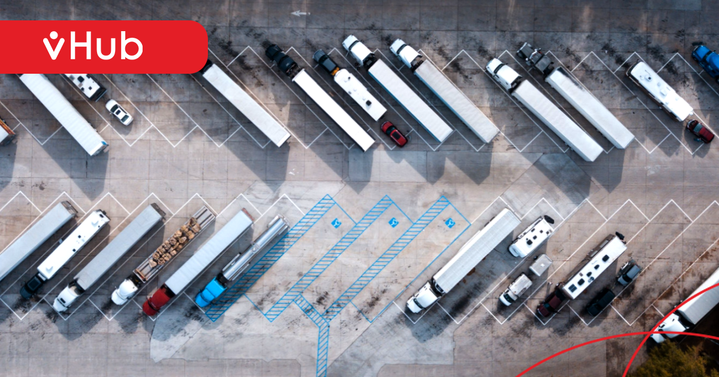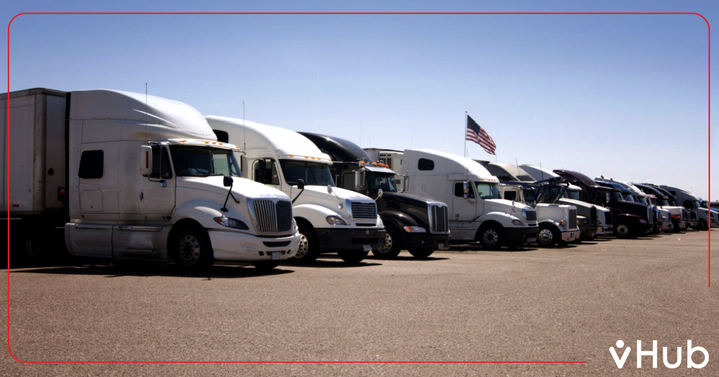When you want to increase capacity with additional trailer space, making the upgrade can be expensive. You may wonder whether buying, leasing, or renting a semi trailer is the right move for you and sustaining growth. While investing too much too early can be a risky business move, failing to take advantage of additional profits with increased cargo space could also mean leaving a lot of money on the table.
There are several factors that impact your trailer decision, including:
- Insurance coverage
- Operating budget
- Expenses and profit margins
- Freight type
- Location or route
- Long-term use needs
- Trailer availability
If you are deciding between commercial semi-trailer rentals and leasing vs. ownership, then you need to consider all the factors. This guide will help you make the most cost-effective and beneficial choice for your business.
Definition of Commercial Trailers
There are several different kinds of commercial semi trailers popular with logistics companies for different reasons. The kind of cargo you haul has a big influence on the type of trailer you want to use. If you tend to move the same products frequently, then freight type will definitely come into play in choosing the right trailer for long-term use. And if you choose to purchase over rent or lease, you are committed to using that type of trailer.
Dry vans or box trailers are one of the most common types of trailers when you think about commercial freight trucking. These trailers are fully enclosed and used for moving non-perishable products.
Reefers are refrigerated boxes that have insulation and environmental control. These trailers are necessary for transporting chilled, frozen, and perishable foods, as well as element-sensitive items like electronics.
Flatbeds are another kind of commonly used trailer because they can carry all kinds of cargo right out on the open bed, making it easy to unload and load. This uncovered trailer can be used for shipping skids of equipment, construction material, or lumber.
Step deck, drop deck, lowboys, or double drop trailers all have a low deck height so tall items can be moved without special permits. These trailers support heavier weights if you add on extra axles, making them ideal for carrying large machinery and oversized items.
Dump/Tipper trailers are necessary when you need to tilt the trailer bed to unload the cargo. These trailers could come with a frame or frameless, and they are a good choice for hauling gravel, dirt, trash, and branches.
Tankers are used to carry liquid and are shaped like a cylinder to support easier extraction. These trailers are best used for beverages, fuel, asphalt, chemicals, and even dry food.
Buying vs. Leasing vs. Renting a Trailer
To understand which option might be best for your company, you should first understand your three options. Here is a quick overview of the three ways you can increase capacity with additional trailer space.
Buying a trailer comes with a hefty upfront cost, but it is a long-term option. When you buy a commercial semi trailer, you become responsible for maintaining it and storing it between loads. Material shortages and increased demand have made it harder and more expensive to purchase a new trailer.
Leasing is a long-term solution to borrowing or sharing a trailer with another owner. Rather than buy your own, a leasing option lets you pay a fixed rate during a specified term. For the duration of the lease, you gain full control over deciding the use and location of the trailer—much like ownership.
Renting makes it possible to increase temporary capacity with a short-term agreement. When you rent a semi trailer, you have more trailer pool flexibility and only pay for each use. Rental solutions can be a great option when you have emergency demand or want to try out various trailers.
Pros and Cons of Buying a Commercial Trailer
Buying a semi trailer might seem like the best option. However, it’s important to consider whether you truly have a long-term need for the additional hauling space. A trailer purchase is a big decision, and you’ll want to think about everything that comes with ownership.
Pros:
- Ownership and full control
- Long-term cost savings
- Valuable business asset
Cons:
- Expense of initial investment
- Ongoing maintenance needs
- Asset management
When you own a trailer, you hemorrhage profits whenever you can’t use it. Idle trailers can be a big drain on your business. In fact, many asset owners consider renting out their trailers if they have a drop in capacity. The option to rent out your asset can help you recap some of your costs and avoid underutilizing an asset.
Pros and Cons of Leasing a Commercial Trailer
One option for long-term trailer use without ownership is to lease a trailer—or pay to use it for a set amount of time. Here are the good and bad parts of leasing.
Pros:
- No large upfront cost
- Flexible payment options
- Extended use agreements
Cons:
- Lack of ownership
- Costly over time
- Set expenses despite use
When you lease a trailer, you agree to a set price for the entire term of the agreement. If your capacity suddenly changes or you need to change trailer type, you are still responsible for your lease agreement. Over time, leasing can become expensive unless you have an ongoing need for a specific season or the exact duration of your lease.
Pros and Cons of Renting a Commercial Trailer
Trailer rental is by far the most flexible of your choices when looking for a new semi trailer. Here are some of the benefits and downsides of trailer rental.
Pros:
- No commitment
- No long-term costs
- Flexibility to try different trailer types
- Ideal for short-term/emergency jobs
Cons:
- Limited customization options
- No ownership
- Pickup and drop-off location/time
The good part about trailer rental is that you can align your trailer selection with the job you plan to do, making sure your margins aren’t too narrow and your profits are worthwhile. However, rentals can be located anywhere, so you may get stuck with an inefficient deadhead trip or inconvenient pickup time depending on the owner. It’s really important to assess exactly how the rental will impact your route and costs.
However, the rental game is changing. Smart trailer rental is making it easier to get quick and optimized matches. Technology has solved many of the inefficiencies and inconveniences plaguing traditional semi trailer rent processes. For example, a digital rental platform makes it possible to browse listings, reserve trailers, and make payments whenever it’s most convenient for you.
Commercial Trailer Rental with vHub’s Smart Trailer Sharing Platform
vHub makes it more beneficial than ever to rent a trailer. Our smart platform makes it possible to instantly assess your route, rental options, and expenses to find the best options out there.
You save time because our technology is always working for you—always looking for the best deals. vHub created Badger to hunt for optimized routes and help you avoid empty miles with rental matching. Our Interlock software helps you manage your agreements, streamline payments, and get valuable reporting on your commercial trailer rentals.
Transportation companies rely on vHub to help them find quick and flexible solutions when they need to increase capacity, get more out of an idle trailer, or reposition an asset. This modern load-out marketplace and smart trailer sharing platform is designed to help logistics players like you find the best solutions to grow their businesses and manage their assets.
Are you ready to get started? We can help you decide whether smart trailer rental is right for you. Sign up for your FREE account today, or contact us to learn more.



